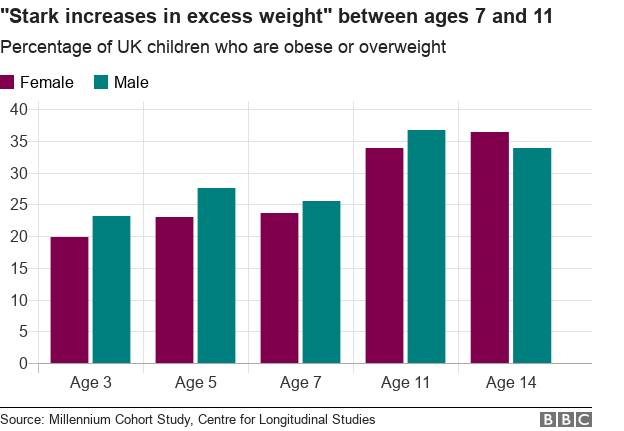Panorama reporter Shelley Jofre visits a chocolate factory in Denmark
| By Shelley Jofre
Reporter, Panorama |

In the same way as taxing cigarettes helped to reduce smoking and related illnesses, could putting up the price of junk food - as Denmark has done - cut obesity rates in the UK?
The first thing that struck me on the taxi journey into Copenhagen was how slim everyone looked.
I really had trouble spotting anyone fat.
And the second thing that became obvious the moment I stepped out of the cab and was almost run over by a cyclist, was that the Danes are clearly no strangers to exercise.
So why on earth has their government become the first in the world to introduce a tax on junk food?
The answer is depressingly simple. They may be among the slimmest in Europe but the Danes do not want to end up as fat as the British.
The UK is the fattest nation in Europe; one third of children and two-thirds of adults are overweight or obese.
At this rate, by 2050 obesity will be costing the state £32bn a year.
In Denmark there are signs that obesity among younger children is actually falling for the first time in 60 years.
But adult obesity is still on the increase and the government is anxious to reverse that trend.
"We've been relying on and emphasising self-responsibility for the last 50 years and it doesn't work," Charlotte Kira Kimby, of the Danish Heart Foundation told me.
"We know that sugar and fat are really what causes obesity to increase. So to target taxes makes sense and should have an impact on health."
'Ruin ourselves'
Think of all your favourite indulgences - chocolate, ice cream, crisps, sweets, cola… and imagine they all cost you significantly more than at present.
That is what is happening in Denmark. If it hit you in the pocket, would it make you change your behaviour? Or would you simply be furious about the food police telling you what to eat?
I met one Danish couple who are raising three young children on a modest income in what is already the most highly-taxed nation in Europe.
 | FIND OUT MORE Join the debate on the Panorama blog |
But they do not resent the government adding further to their grocery bills; far from it.
Lars Moerck and Karina Kirkefeldt have both struggled with obesity in the past.
At his heaviest Lars jokes that he had the belly of "an English hooligan".
Having both lost substantial amounts of weight, neither of them wants their children to have the same problems.
"We ruin ourselves and somebody has to take action. So if we can't do it, then the government should make health for the people," said Karina.
And Charlotte Kira Kimby denies that the new taxes amount to government nannying.
"We still have the same free choice to buy the things we would like to buy in the shops.
"What is happening with this kind of tax is that we actually just see the state going in and balancing price because it is cheap to produce food with a high content of sugar, fat and salt."
Calorie cuts
Not everyone has welcomed the changes though.
 Jesper Moller believes consumers are already demanding healthier options |
As chief executive of leading chocolate company Toms, Jesper Moller is Copenhagen's very own Willy Wonka.
He says firms like his are already reducing the calorie content of their products in response to customer demand.
He thinks the new taxes are an unnecessary burden.
"It just makes it very complicated to be a confectionary producer in Denmark. We already have some of the highest labour costs in the world," he said.
Obesity expert Professor Peter Kopelman of the Royal College of Physicians argues that the UK could learn a lesson from the lean Danes.
He believes that there is a clear parallel with the taxation of cigarettes.
Prof Kopelman said: "When cigarettes were taxed, you found that there was an immediate decline in the number that were bought.
"We also saw that there was a decline in the diseases that complicate cigarette smoking. I think there are lessons to learn for unhealthy food."
The Health Secretary Andrew Lansley is due to publish a white paper on public health for England shortly. In it, he will lay out his strategy for tackling obesity.
But it seems any idea of a junk food tax is already off the table.
"Nudges are very important. Tax is not a nudge, tax is a shove," he said.
"If you start down the route of taxation, quite often you get quite a lot of push back against that. The public don't think it's our job to be trying to tell people what to do."
Read his lips. No new taxes.
It is too early to tell whether the Danish experiment will be successful but at least they have time on their side.
In the UK, the clock is ticking.
Public health experts fear that if we do not take steps to improve our diet in the UK, by 2050 we could expect a 20% rise in heart disease and a staggering 70% rise in Type 2 diabetes.
No-one would argue there is anything sweet about those statistics.
Panorama: Tax the Fat is on BBC One on Monday 15 November at 2030 GMT. Or watch it later via the BBC iPlayer. Join the debate on the Panorama blog.
 GETTY IMAGES
GETTY IMAGES











